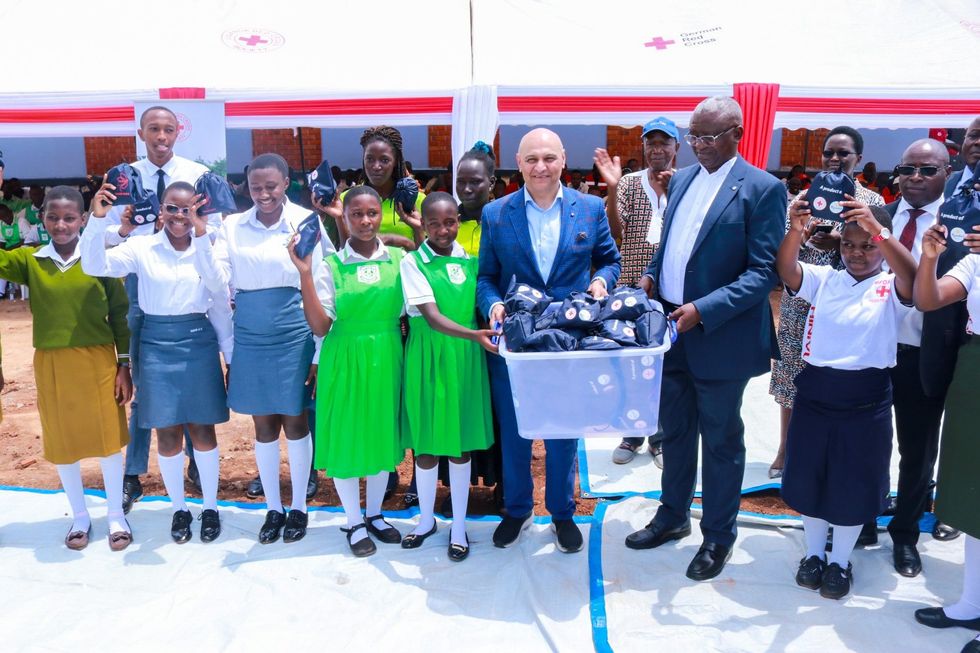A significant stride in combating period poverty, which is a lack of access to safe means of managing menstruation has been unveiled with the inauguration of a sanitary pads manufacturing plant in Namakwa, Mukono district of Uganda.
This initiative, driven by a generous grant from the Randal Charitable Foundation and executed in collaboration with the Uganda Red Cross Society, aims to transform the lives of approximately 50,000 Ugandan girls and women annually.
The Keep a Girl In School (KAGIS) manufacturing plant was launched in Uganda on August 11, 2023, by secretary general of the Uganda Red Cross Society, Robert Kwesiga, and Dr Nik Kotecha OBE DL, founder and chairman of the Randal Charitable Foundation, together with the director, basic and secondary education at the Ministry of Education and Sports in Uganda.
Following the launch ceremony, Dr Kotecha, a former Ugandan resident who emigrated to the United Kingdom as a child refugee in 1972 said, “For many women and girls, poor access to high quality sanitary pads, as well as to toilets and washrooms, is a huge barrier to attending school and can result in seriously limiting future career choices.”
He added, “The Randal Foundation is passionate about enabling every young person to reach their full potential, and equal access to education for girls and boys is an essential part of this. We are also huge advocates of supporting communities out of poverty by creating long-term sustainable economic opportunities and employment.”
The manufacturing plant represents a pioneering effort to address the pressing issue of period poverty. This endeavour is expected to have far-reaching effects, ranging from diminishing missed educational opportunities for girls to creating local employment prospects.
With the capacity to produce 200,000 re-usable sanitary pads each year, the manufacturing plant will directly combat the educational setbacks caused by inadequate sanitary protection during menstruation.
The associated absenteeism, which affects girls' education by up to 18% of the academic year, will be mitigated.
Moreover, this initiative will provide valuable training and job opportunities for vulnerable girls and women, ensuring the plant's sustained impact.
The partnership between Uganda Red Cross Society and Randal Charitable Foundation is poised to make a profound change in the lives of Ugandan women and girls, offering them access to high-quality sanitary protection and unlocking their educational and career potential.
The Randal Charitable Foundation's investment not only facilitated the establishment of the manufacturing facility but also extended to the training and skill development of women and girls involved in producing and marketing the sanitary pads.
The Foundation's commitment to tackling period poverty is also reflected in the availability of resources for supervision and monitoring.
The manufacturing plant will distribute around 20% of its yearly pad production, or 10,000 pads, to vulnerable schoolgirls free of charge. The remaining 80% will be sold to the wider community at a subsidised rate, ensuring the plant's long-term viability.

This endeavour aligns with the broader vision of the KAGIS initiative, championed by the Uganda Red Cross Society and the Ministry of Education and Sports since 2019.
The initiative aims to address the challenges posed by menstruation to adolescent girls and young women, including the lack of access to hygienic sanitary wear and associated educational hindrances.
Kwesiga explained that the KAGIS initiative addresses the issue of girls missing school due to a lack of access to sanitary pads during their monthly cycles. He expressed gratitude to the Randal Charitable Foundation for their substantial assistance in establishing a manufacturing plant in Uganda.
This plant aims to enable more girls to stay in school by producing and providing reusable pads. In the coming three years, URCS plans to expand the production of reusable pads to benefit between 100,000 to 150,000 women and girls in Uganda.
Kwesiga called upon both public and private partners to contribute to the KAGIS initiative by supporting vulnerable girls' education through the procurement of reusable pads from the newly established manufacturing facility.
While the manufacturing plant is currently importing materials, the Uganda Red Cross Society is actively advocating for local production to ensure sustainability.
The KAGIS initiative falls within the URCS Health and Social Service Agenda, encompassing Water, Sanitation, and Hygiene (WASH) Interventions. This holistic approach underscores the role of sanitation in critical areas like health, education, protection, and security for women and adolescent girls.
Period poverty, which deprives millions of women and girls of access to safe menstrual management, impacts education, health, and dignity on a global scale.
This manufacturing plant marks a notable step toward alleviating this challenge in Uganda, simultaneously enhancing education and opportunities for girls and women.
The Randal Charitable Foundation's unwavering commitment to saving lives and improving the quality of life aligns with the URCS's mission, showcasing the power of collaboration in driving positive change.
As this innovative venture gains momentum, it holds the promise of breaking down barriers and empowering Ugandan girls and women to pursue their true potential.




















